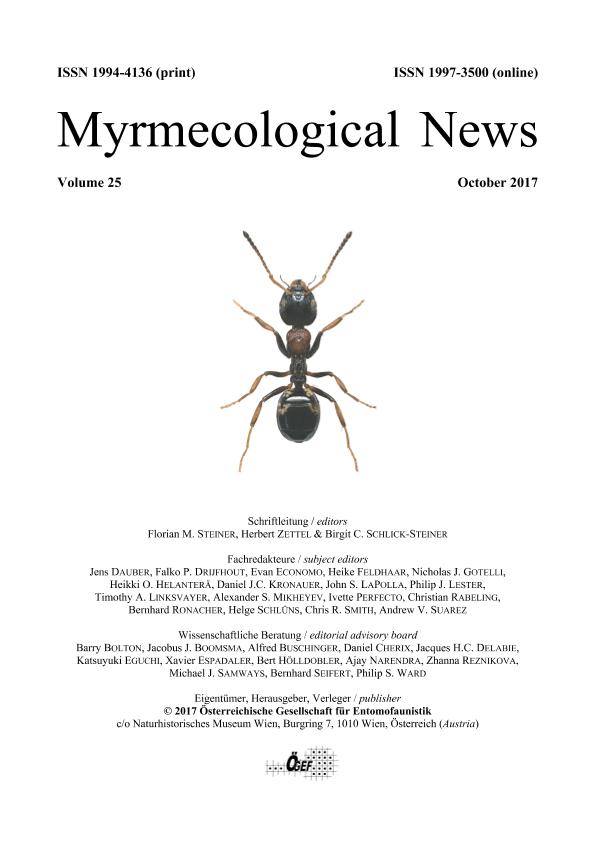Mostrar el registro sencillo del ítem
dc.contributor.author
Nobúa Behrmann, Beatriz Elisa

dc.contributor.author
Lopez de Casenave, Javier Nestor

dc.contributor.author
Milesi, Fernando Adrian

dc.contributor.author
Farji Brener, Alejandro Gustavo

dc.date.available
2018-01-23T20:43:24Z
dc.date.issued
2017-10
dc.identifier.citation
Nobúa Behrmann, Beatriz Elisa; Lopez de Casenave, Javier Nestor; Milesi, Fernando Adrian; Farji Brener, Alejandro Gustavo; Coexisting in harsh environments: temperature-based foraging patterns of two desert leafcutter ants (Hymenoptera: Formicidae: Attini) ; Oesterreichische Gesell Entomofaunistik; Myrmecological News; 25; 10-2017; 41-49
dc.identifier.issn
1994-4136
dc.identifier.uri
http://hdl.handle.net/11336/34353
dc.description.abstract
Dominant herbivores, like leafcutter ants, have a strong impact on the ecosystems they inhabit. Understanding which factors regulate their foraging rates is crucial for understanding ecosystem dynamics. In desert habitats, environmental factors, such as temperature, play a major role in regulating ants' behavior. We studied the role of ground temperature in regulating daily and seasonal activity patterns of two coexisting leafcutters ant species, Acromyrmex lobicornis (EMERY, 1888) and A. striatus (ROGER, 1863), in the Monte desert of Argentina. We measured the variations in activity levels and soil temperature every two hours throughout the day in colonies of both species every season for two consecutive years. Temperature was a good predictor of both the timing of colony activation (the onset and end of their daily foraging activities) and foraging intensity (the number of workers devoted to foraging tasks). However, temperature affected each species differently: Acromyrmex lobicornis foraged at lower temperatures (10 - 35 °C) than A. striatus (27 - 45 °C). Our results suggest that these two species have different thermal tolerance ranges that result in temporally separated foraging activities. We suggest that interference competition may have driven this temperature and temporal specialization in these two sympatric species, given their similar sizes and diets. Field observations of activity vs. temperature in allopatry, and behavioral tests in controlled conditions should provide further evidence to test this hypothesis.
dc.format
application/pdf
dc.language.iso
eng
dc.publisher
Oesterreichische Gesell Entomofaunistik

dc.rights
info:eu-repo/semantics/openAccess
dc.rights.uri
https://creativecommons.org/licenses/by-nc-sa/2.5/ar/
dc.subject
Leaf-Cutting Ants
dc.subject
Foraging
dc.subject
Herbivory
dc.subject.classification
Otras Ciencias Biológicas

dc.subject.classification
Ciencias Biológicas

dc.subject.classification
CIENCIAS NATURALES Y EXACTAS

dc.title
Coexisting in harsh environments: temperature-based foraging patterns of two desert leafcutter ants (Hymenoptera: Formicidae: Attini)
dc.type
info:eu-repo/semantics/article
dc.type
info:ar-repo/semantics/artículo
dc.type
info:eu-repo/semantics/publishedVersion
dc.date.updated
2017-12-15T14:33:18Z
dc.identifier.eissn
1997-3500
dc.journal.volume
25
dc.journal.pagination
41-49
dc.journal.pais
Austria

dc.description.fil
Fil: Nobúa Behrmann, Beatriz Elisa. Consejo Nacional de Investigaciones Científicas y Técnicas. Oficina de Coordinación Administrativa Ciudad Universitaria. Instituto de Ecología, Genética y Evolución de Buenos Aires. Universidad de Buenos Aires. Facultad de Ciencias Exactas y Naturales. Instituto de Ecología, Genética y Evolución de Buenos Aires; Argentina
dc.description.fil
Fil: Lopez de Casenave, Javier Nestor. Consejo Nacional de Investigaciones Científicas y Técnicas. Oficina de Coordinación Administrativa Ciudad Universitaria. Instituto de Ecología, Genética y Evolución de Buenos Aires. Universidad de Buenos Aires. Facultad de Ciencias Exactas y Naturales. Instituto de Ecología, Genética y Evolución de Buenos Aires; Argentina
dc.description.fil
Fil: Milesi, Fernando Adrian. Consejo Nacional de Investigaciones Científicas y Técnicas. Centro Científico Tecnológico Conicet - Patagonia Norte. Instituto de Investigaciones en Biodiversidad y Medioambiente. Universidad Nacional del Comahue. Centro Regional Universidad Bariloche. Instituto de Investigaciones en Biodiversidad y Medioambiente; Argentina
dc.description.fil
Fil: Farji Brener, Alejandro Gustavo. Consejo Nacional de Investigaciones Científicas y Técnicas. Centro Científico Tecnológico Conicet - Patagonia Norte. Instituto de Investigaciones en Biodiversidad y Medioambiente. Universidad Nacional del Comahue. Centro Regional Universidad Bariloche. Instituto de Investigaciones en Biodiversidad y Medioambiente; Argentina
dc.journal.title
Myrmecological News

dc.relation.alternativeid
info:eu-repo/semantics/altIdentifier/url/https://myrmecologicalnews.org/cms/index.php?option=com_content&view=category&id=1483&Itemid=407
Archivos asociados
